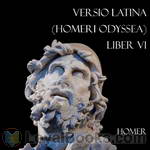|
Books Should Be Free Loyal Books Free Public Domain Audiobooks & eBook Downloads |
|
|
Books Should Be Free Loyal Books Free Public Domain Audiobooks & eBook Downloads |
|
Latin: 63 free audio & ebooks |
|---|
|
Book type:
Sort by:
View by:
|
By: Homer | |
|---|---|
 Versio Latina (Homeri Odyssea) Liber VI
Versio Latina (Homeri Odyssea) Liber VI
The Versio Latina, or Latin translation of the works of Homer, has existed since the 14th century, but was first printed, under the name of Andreas Divus, in 1537. It is a crib, to give it no finer name, but a crib which had immense influence, being the first introduction to Homer for generations of mediaeval and early modern scholars.(Introduction by hefyd) | |
By: René Descartes (1596-1650) | |
|---|---|
 Meditationes de prima philosophia
Meditationes de prima philosophia
| |
By: Publius Vergilius Maro (70-19 BC) | |
|---|---|
 Eclogae
Eclogae
This book of poems, written between 42 en 39 BC, was a bestseller in ancient Rome, and still holds a fascination today. Held to be divinely inspired not only by the Romans themselves, but by the Medieval Catholic church, The Eclogues is one of the most beloved collections of Latin short poetry.This recording is done in the original Latin, in the form of a dramatic reading: in each eclogue, every character is read by a different reader. Two eclogues are included twice – giving you a choice of reader. | |
By: Lucius Annaeus Seneca (4 BC - 65) | |
|---|---|
 Octavia Praetexta
Octavia Praetexta
| |
By: Marcus Tullius Cicero (106 BC - 43 BC) | |
|---|---|
 First Oration of Cicero Against Catiline with Notices, Notes and Complete Vocabulary
First Oration of Cicero Against Catiline with Notices, Notes and Complete Vocabulary
| |
 Cicero's Orations
Cicero's Orations
| |
By: Biblia Sacra Vulgata | |
|---|---|
 Biblia Sacra Vulgata: Psalmi XXII
Biblia Sacra Vulgata: Psalmi XXII
Psalm 22 appears as Psalm 23 in modern English translations of the Bible. – Psalmi XXII Bibliae Sacrae Vulgatae, recitatus in lingua Latina. | |
By: Desiderius Erasmus (1469-1536) | |
|---|---|
 Encomium Artis Medicae
Encomium Artis Medicae
| |
By: Isaac Newton (1642-1727) | |
|---|---|
 Philosophiae Naturalis Principia Mathematica
Philosophiae Naturalis Principia Mathematica
| |
By: John Henry Newman (1801-1890) | |
|---|---|
 Dissertatiunculae Quaedam Critico-Theologicae
Dissertatiunculae Quaedam Critico-Theologicae
| |
By: Saint Augustine of Hippo (354-430) | |
|---|---|
 Confessionum Libri Tredecim
Confessionum Libri Tredecim
Confessions (Latin: Confessiones) is the name of an autobiographical work, consisting of 13 books, by St. Augustine of Hippo, written between AD 397 and AD 398. Modern English translations of it are sometimes published under the title The Confessions of St. Augustine in order to distinguish the book from other books with similar titles. Its original title was "Confessions in Thirteen Books", and it was composed to be read out loud with each book being a complete unit. | |
By: Julius Caesar (100 BC - 44 BC) | |
|---|---|
 C. Iuli Caesaris De Bello Gallico
C. Iuli Caesaris De Bello Gallico
| |
 The Gate to Cæsar
The Gate to Cæsar
| |
 Commentarii de Bello Gallico Libri V-VIII
Commentarii de Bello Gallico Libri V-VIII
| |
By: Apicius | |
|---|---|
 Apicii librorum X qui dicuntur De re coquinaria quae extant
Apicii librorum X qui dicuntur De re coquinaria quae extant
| |
By: Gaius Valerius Catullus (84 BC - 54 BC) | |
|---|---|
 Catulli Carmina
Catulli Carmina
| |
By: Marcus Terentius Varro | |
|---|---|
 De M. Terenti Varronis Libris Grammaticis
De M. Terenti Varronis Libris Grammaticis
| |
By: Marcus Fabius Quintilianus (35-100?) | |
|---|---|
 M. Fabi Quintiliani institutionis oratoriae liber decimus
M. Fabi Quintiliani institutionis oratoriae liber decimus
| |
By: Aulus Gellius | |
|---|---|
 Stories from Aulus Gellius Being Selections And Adaptations From The Noctes Atticae
Stories from Aulus Gellius Being Selections And Adaptations From The Noctes Atticae
| |
By: Tiberius Catius Silius Italicus | |
|---|---|
 Punicorum Libri Septemdecim
Punicorum Libri Septemdecim
| |
By: Diego Collado (-1638) | |
|---|---|
 Ars grammaticae Iaponicae linguae
Ars grammaticae Iaponicae linguae
| |
By: Carolus Linnaeus (1707-1778) | |
|---|---|
 Species Plantarum Sections I-III
Species Plantarum Sections I-III
| |
By: John Caius (1510-1573) | |
|---|---|
 De Canibus Britannicis Of Englishe Dogges
De Canibus Britannicis Of Englishe Dogges
| |
 De Pronunciatione Graecae & Latinae Linguae
De Pronunciatione Graecae & Latinae Linguae
| |
 De Rariorum Animalium atque Stirpium Historia
De Rariorum Animalium atque Stirpium Historia
| |
By: Herman Boerhaave (1668-1738) | |
|---|---|
 Opuscula Selecta Neerlandicorum Nederlandsch Tijdschrift voor Geneeskunde
Opuscula Selecta Neerlandicorum Nederlandsch Tijdschrift voor Geneeskunde
| |
 De Usu Ratiocinii Mechanici in Medicina
De Usu Ratiocinii Mechanici in Medicina
| |
By: Persius | |
|---|---|
 The Satires of A. Persius Flaccus
The Satires of A. Persius Flaccus
| |
By: Jean Bodin (1530-1596) | |
|---|---|
 Colloquium heptaplomeres de rerum sublimium arcanis abditis
Colloquium heptaplomeres de rerum sublimium arcanis abditis
| |
By: Sextus Propertius (ca. 50 BCE-16 BCE) | |
|---|---|
 Sexti Properti Carmina
Sexti Properti Carmina
| |
By: Ulysse Chevalier (1841-1923) | |
|---|---|
 Chartvlarivm Ecclesiae Sancti Petri de Bvrgo Valentiae Ordinis Sancti Avgvstini
Chartvlarivm Ecclesiae Sancti Petri de Bvrgo Valentiae Ordinis Sancti Avgvstini
| |
By: Susan Paxson | |
|---|---|
 Two Latin Plays for High-School Students
Two Latin Plays for High-School Students
| |
By: Théodore de Bèze (1519-1605) | |
|---|---|
 De francicae linguae recta pronuntiatione
De francicae linguae recta pronuntiatione
| |
By: J. A. (John Allen) Giles (1808-1884) | |
|---|---|
 Sancti Hilarii: Pictaviensis Episcopi Opera Omnia Patrologiae Cursus Completus; Tomas X
Sancti Hilarii: Pictaviensis Episcopi Opera Omnia Patrologiae Cursus Completus; Tomas X
| |
By: Georg Forster (1754-1794) | |
|---|---|
 Florulae Insularum Australium Prodromus
Florulae Insularum Australium Prodromus
| |
 De Plantis Esculentis Insularum Oceani Australis Commentatio Botanica
De Plantis Esculentis Insularum Oceani Australis Commentatio Botanica
| |
By: Rudolf Pohl (1879-) | |
|---|---|
 De Graecorum Medicis Publicis
De Graecorum Medicis Publicis
| |
By: Université de Paris. Faculté de théologie | |
|---|---|
 Le catalogue des livres censurez par la faculté de theologie de Paris
Le catalogue des livres censurez par la faculté de theologie de Paris
| |
By: Hieronymus David Gaubius (1705?-1780) | |
|---|---|
 Chemiam artibus academicis jure esse inserendam
Chemiam artibus academicis jure esse inserendam
| |
By: Giuseppe Peano (1858-1932) | |
|---|---|
 De Latino sine Flexione; Principio de Permanentia
De Latino sine Flexione; Principio de Permanentia
| |
By: Jöns Jacob Berzelius (1779-1848) | |
|---|---|
 Nova analysis aquarum Medeviensium
Nova analysis aquarum Medeviensium
| |
By: Saint Hilary (-367?) | |
|---|---|
 Sancti Hilarii: Epistola Ad Abram Filiam Suam (Circa Finem Anni 558 Missa.) Patrologiae Cursus Completus; Tomus X
Sancti Hilarii: Epistola Ad Abram Filiam Suam (Circa Finem Anni 558 Missa.) Patrologiae Cursus Completus; Tomus X
| |
By: anonymous | |
|---|---|
 Historia Apollonii Regis Tyri
Historia Apollonii Regis Tyri
Apollonius of Tyre is the subject of an ancient short novella, popular during medieval times. Existing in numerous forms in many languages, the text is thought to be translated from an ancient Greek manuscript, now lost. The earliest manuscripts of the tale, in a Latin version, date from the 9th or 10th century; the most widespread Latin versions are those of Gottfried von Viterbo, who incorporated it into his Pantheon of 1185 as if it were actual history, and a version in the Gesta Romanorum. Shakespeare’s play Pericles, Prince of Tyre was based in part on Gower’s version, with the change of name probably inspired by Philip Sidney’s Arcadia... | |
By: Unknown (70 BC - 19 BC) | |
|---|---|
 The Aeneid
The Aeneid
| |
By: Gaius Julius Caesar | |
|---|---|
 De Bello Gallico Libri Septem
De Bello Gallico Libri Septem
In this book the famous Gaius Julius Caesar himself describes the seven years of his war in Gaul.When Caesar got proconsul of Gallia and Illyria in 58 B.C, the conquest of land in Gaul was an urgent need, both to improve his political standing and to calm his creditors in Rome. So Caesar claims his interest for a very large area already in the first sentence.His steps and measures always appear clear and logic, but this simplicity is the result of a strict discipline in style. Caesar really choses his words, and the list of standard words that he never or rarely uses, is astonishing... | |
By: Unknown (65 BC - 8 BC) | |
|---|---|
 Odes and Epodes
Odes and Epodes
| |
 Fasti
Fasti
| |
 The Georgics (Latin)
The Georgics (Latin)
| |
By: Various | |
|---|---|
 Le procès des Templiers Tome I.
Le procès des Templiers Tome I.
| |
By: Anonymous | |
|---|---|
 Latin Vulgate, Esther
Latin Vulgate, Esther
| |
 Latin Vulgate, Daniel: Prophetia Danielis
Latin Vulgate, Daniel: Prophetia Danielis
| |
 Prophetia Ionae
Prophetia Ionae
| |
 Latin Vulgate, Esther: Liber Esther
Latin Vulgate, Esther: Liber Esther
| |
By: Various | |
|---|---|
 De Essentia Patris Et Filii Patrologiae Cursus Completus; Series Latini; Tomas vol. X; Columns 887-888
De Essentia Patris Et Filii Patrologiae Cursus Completus; Series Latini; Tomas vol. X; Columns 887-888
| |
By: Virgil (70 BC - 19 BC) | |
|---|---|
 Aeneidis Libri XII
Aeneidis Libri XII
Aeneas flees the destruction of Troy, abandons Dido, queen of the Carthaginians, and wends his way to Latium in Italy, where slaying Turnus, leader of native resistance, he founds the future Rome. | |
By: Titus Lucretius Carus (c. 99 BC - 55 BC) | |
|---|---|
 De Rerum Natura
De Rerum Natura
An exposition of Epicurus atomic theory and the ethical tenets based upon it. Drawing upon this materialist philosophy, Lucretius cites the fear of death as the cause of man's ills, and shows the way to freedom from that fear. | |
By: Virgil (70 BC - 19 BC) | |
|---|---|
 Georgica
Georgica
Vergil's Georgica is the culmination of a long tradition in antiquity of poems about agriculture, beginning with Hesiod in the eighth c. BC. His poem is a rich admixture of allusion to that tradition: didactic poem, eulogium of Augustus, the neoteric epyllion about Orpheus, Epicurean philosophy as presented by his predecessor and model, Lucretius. Thomas Jefferson imagined his gentleman farmer tilling his fields with a copy of the Georgics between the handles of the plowshare. | |
By: Thomas à Kempis (1380-1471) | |
|---|---|
 Imitatione Christi
Imitatione Christi
The Imitation of Christ is widely considered one of the greatest manuals of devotion in Christianity. The life of Christ is presented as the highest study possible to a mortal, as Jesus’ teachings far excel all the teachings of the saints. The book gives counsel to read the scriptures, statements about the uses of adversity, advice for submission to authority, warnings against temptation and how to resist it, reflections about death and the judgment, meditations upon the oblation of Christ, and admonitions to flee the vanities of the world. - | |
By: Lucius Annaeus Seneca (4-65) | |
|---|---|
 Epistulae Morales Selectae
Epistulae Morales Selectae
Seneca is an important repository of Stoic doctrine. His reputation, based on the ancient testimony, has remained ambiguous down to the present day: he was a Stoic hero who attempted to advise Nero, he was a dissolute hypocrite, he was a Christian saint. That said, his letters provided a format for philosophical discourse that long remained valid for Western Europe. His musings always sprang from concrete situations: the games in the Coliseum, the noise from a public bath below his apartment. Montaigne admired the style of his Latin, which he called "nerveux": taut and full of energy. | |
By: Marcus Porcius Cato (236 BC - 149 BC) | |
|---|---|
 De Agricultura
De Agricultura
Noted for being the most extensive piece of early Latin prose, it abounds in archaic imperatives and shows an almost total lack of subordinate clauses. Its subject matter is the pedestrian business of managing a Roman farm in the second century BC. The simplicity, however, may be only partially genuine. For Cato had a strong political and social agenda, based on the rejection of foreign, i.e., Greek, influences and the fostering of traditional Roman values, for which the persona of the plain rustic speaker may have proved useful. | |
By: Saint Benedict of Nursia (480-547) | |
|---|---|
 Regula Sancti Benedicti
Regula Sancti Benedicti
The Rule of Saint Benedict (Regula Benedicti) is a book of precepts written by St. Benedict of Nursia for monks living communally under the authority of an abbot. Since about the 7th century it has also been adopted by communities of women. During the 1500 years of its existence, it has become the leading guide in Western Christianity for monastic living in community. The spirit of St Benedict's Rule is summed up in the motto of the Benedictine Confederation: pax ("peace") and the traditional ora et labora ("pray and work").(Introduction from Wikipedia) | |
By: Anicius Manlius Severinus Boethius | |
|---|---|
 Consolatione Philosophiae
Consolatione Philosophiae
Consolation of Philosophy is a philosophical work by Boethius written in about the year 524 AD. It has been described as the single most important and influential work in the West in medieval and early Renaissance Christianity, and is also the last great work that can be called Classical. Consolation of Philosophy was written during Boethius' one year imprisonment while awaiting trial, and eventual horrific execution, for the crime of treason by Ostrogothic King Theodoric the Great. Boethius was at the very heights of power in Rome and was brought down by treachery... | |
By: Saint Augustine of Hippo (354-430) | |
|---|---|
 Civitate Dei Libri XXII
Civitate Dei Libri XXII
The City of God Against the Pagans , often called The City of God, is a book of Christian philosophy written in Latin by Augustine of Hippo in the early 5th century AD. The book was in response to allegations that Christianity brought about the decline of Rome and is considered one of Augustine's most important works, standing alongside The Confessions, The Enchiridion, On Christian Doctrine and On the Trinity. As a work of one of the most influential Church Fathers, The City of God is a cornerstone... | |